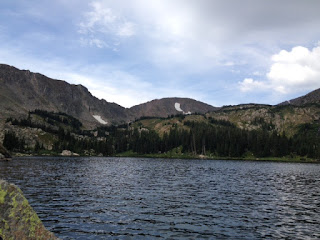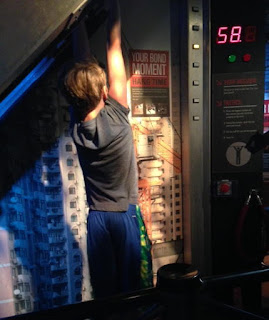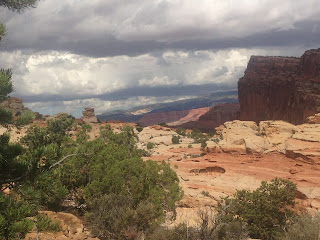(If you received this
blog by email, you might want to visit the actual site. The pictures work much
better there.
Just click on the
title “Dickens and the waterfall”)
It was the
best of times, it was the worst of times,
it was the
age of wisdom, it was the age of foolishness,
it was the
epoch of belief, it was the epoch of incredulity,
it was the
season of Light, it was the season of Darkness,
it was the
spring of hope, it was the winter of despair,
we had
everything before us, we had nothing before us …
- Charles Dickens, A
Tale of Two Cities (1859)
Here it is,
amazingly, the end of another year. It’s been a remarkable one in so many ways.
Dickens pretty much nailed it. It’s all so disorienting, I thought a bit of
reflection on what the year actually held might help make sense of it. It’ll
also serve as a catch-up of sorts, since I was incommunicado here for most of
the year.
And, as so often
happens, I figured out what I wanted to say as I wrote. Hence the odd allusion
to the waterfall in the title.
So, for starters, I promised to comment on my
bloggish silence from January to November. The short explanation is that I had
“blogger’s block.” But that’s a cop-out, a description that explains nothing.
So let me try again. At some point, I noticed that instead of enjoying writing,
I was feeling obligated to do it, and then I got anxious when I didn’t. The
best defense against anxiety is avoidance (think elevator phobia), so that’s
what I did. But why the lack of enjoyment, when I’ve always loved writing? And
why the sense of obligation to do a totally voluntary activity? The second is
easier: I know it’s good for me to have an outlet for my ponderings, and some
folks appreciate it, so of course I should
do it. The first is harder: why the resistance? Complicated. Partly just too busy.
Partly, some experiences that left me feeling tentative about writing. Partly a
growing discomfort with the “selfie /facebook culture” and the assumption that everyone (anyone) would want to hear about what I was
doing or thinking. Seemed pretty self-centered to me … heck, writing about
myself and my life is self-centered,
by definition.
So, although people
encouraged me to return to this space, I stayed away. Until November 8. At that
point, I so needed an outlet for my feelings and thoughts—and connections to a
wider community—that all the rest seemed unimportant. That elevator stuff is
still there, in the background. But it just doesn’t matter in the same way. I
need to be here, and if others appreciate it, that’s a bonus.
So, a few glimpses
of what I would have written about in 2016, if I’d been writing.
It was the
best of times, it was the worst of times
You may recall that
2015 was the year of my return to fitness program, culminating in a hike
in Southern Utah (specifically, Capitol Reef) that had been my aspirational
aim through my self-rehab process. I had a wonderful hike, although I didn’t
find the arch I was aiming for. I loved the day … and in the back of my mind, I
wanted to go back and try again.
It was the age
of wisdom, it was the age of foolishness
This
past spring, feeling my oats after a full year of orthopedic health, I decided
to visit Utah again, this time to hike a favorite trail in the Needles District
of Canyonlands. En route, I stopped to take a shortish hike in a small canyon I
remember from my desert rat days. It was a very hot day, but I’ve always loved
the dessert heat, so I figured I’d “warm up” for the next
day’s planned long hike by doing this short one.
Right at lunchtime. Perfect for a picnic beneath the arch at the canyon’s
end.
Unfortunately, I hadn’t
reckoned with what about 15 years’ added age would do to my tolerance for
mid-day 103° direct sunshine. I struggled out of the canyon with a mild case of
heat exhaustion, sadly certain that I couldn’t recover enough for the next
day’s long (equally hot) walk in Canyonlands.
So I postponed that hike until next year … and congratulated myself on
my wisdom.
And I was back to
the best of times …

We traveled to a
few conferences, and added in playful travels, like a trip to DC with my
partner’s 14-year-old grandson. Predictably, his favorite parts were the Air
and Space Museum and crabbing with his great uncle. Some pictures, but no blog.
Then there were the un-travels: a couple of “staycations” at a hotel,
featuring sleep-ins, coffee and newspaper while lounging in the room, and lots
of movies. Blog material galore.
To finish off the
summer, my partner joined me on a trip back to the site of last year’s delightful,
but incomplete, adventure. The walk in Capitol Reef was wonderful, again, and
this time, I found the fork in the trail that led to Cassidy Arch. And here it is (in slightly washed out light).
Then
came the campaign and the election, the staple of my schedule through the fall
(with a side of weekly hikes). Starting in September, I spent several hours a
couple of times each week working on the election—first doing voter
registration, then shifting to door-to-door get-out-the-vote canvassing. I
hated it. Every time I got out of my car, I had to talk to myself: "Just
go do it, Janis. One door-knock at a time." I knew I had to do whatever I
could, because if she lost / if he won, I didn't want to wonder if I
should have done more.
The campaign and
its outcome well warrant the remainder of Dickens’ words:
it was the
epoch of belief, it was the epoch of incredulity,
it was the
season of Light, it was the season of Darkness,
it was the
spring of hope, it was the winter of despair
You know what the
campaign was like. Belief in the ultimate power of the process to select
someone qualified, at least somewhat, for this most important job … and incredulity
as we watched his ignorance and boorishness be rewarded over and over. The season
of Light emerged occasionally in the words of someone sane, brilliant, speaking
from the depths—like Michelle Obama—but that Darkness was close behind, as even
brilliance and poignancy were disregarded. The perpetual spring of hope, as the
polls continued to show 90%+ probability that the nation would soon have its
first woman president. And the winter of despair that settled in early in the
evening of November 8, when even the (very partisan) commentators couldn’t
tweak the results enough to make her victory look likely.
we had everything before us, we had nothing
before us …
And you know what
happened on November 8. It’s what brought me back here. That was, without a doubt,
among the worst of times. We had everything before us: the expectation for
positive change ahead, the certainty that at least the outrageousness of the
campaign would end on a sane note. And then nothing. Hopes dashed, confusion,
anger, fear setting in. Nothing to feed the dreams we might have dared dream if
she’d won.
On the other hand,
that “nothing” did actually give us something: one of the biggest challenges of
our lives (at least mine). I think about that arch I didn’t find last year, but
reached this year. And the trail that I decided not to hike in a moment of
clarity, but that I plan to walk next year. There’s a lesson here.
And that brings to
mind a now decades-old story about a waterfall:
I was on a canoe trip
with friends in the Boundary Waters between Minnesota and Canada, six of us, each pair paddling a two-woman-and-a-dog craft crossing lake after lake, portaging in between. We were pulling away from the shore onto one of the string of lakes we were traversing. Just
around a bend in the shore from where we were putting in was a falls that
flowed from this lake into the one below. As we pulled away from the shore, the
current drawn by the falls took our canoe, and we knew we were headed for
trouble. I was thinking to myself: This is it. I can just give up and go with this rushing
water and see what happens … or I can put all my energy into it, and maybe we can get out of the flow. Without saying a thing, both of us started paddling harder
than we ever imagined we could. Slowly, we started making headway, dragging the canoe out of the current and into the calm water of the lake, where we set out in just the direction we had planned.
Landfall that day and
camp that night felt especially good. We picked wild blueberries the next
morning right outside the tent.
I don’t think of
that story too often, but it seems fitting now.
©
Janis Bohan, 2010-2015. Use of this content is welcome with attribution and a
link to the post.
-----------------------------------------------------------------

















